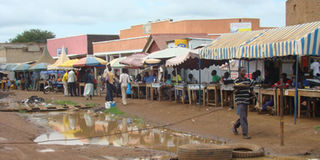Govt secures Shs800m land for northern border market

Makeshift structures that Ugandans occupy at Elegu border town. Government has secured a 100-hectare piece of land at Elegu where they are to construct a market. PHOTO by Andrew Bagala
What you need to know:
Benefit. Establishment meant to shield Ugandan traders from hostilities faced in South Sudan.
Kampala.
The government has secured 100 hectares of land in northern Uganda to construct a border market where Ugandan traders and their South Sudanese counterparts will be operating from.
Construction of the Elegu Border Market is not only intended to facilitate the declining cross border trade between the two neighbouring countries, but also shield Uganda traders from the routine hostilities and threats they suffer at the hands of some rogue South Sudan nationals.
“The construction of Elegu Border Market in Amuru will solve the problem of Ugandan traders who complain of mistreatment in South Sudan,” Trade and Industry minister Amelia Kyambadde said in a press statement issued earlier in the week.
She continued: “The traders will now be able to sell their merchandise in this market (Elegu Market), avoiding entering South Sudan.”
Kampala City Traders Association (KACITA) chairman Everest Kayondo, in an interview yesterday, noted that the market will boost export trade and lure many traders who have since stopped doing business with South Sudan over hostilities.
He said: “We recommended that government put an alternative where South Sudanese will buy products from us and they in turn go sell it to their people. We thought this will solve the problem of mistreatment that our people face in South Sudan.”
The Permanent Secretary Ministry of Trade, Mr Julius Onen, said the ministry has spent around Shs800 million to secure land for the construction of Elegu Border Market. “The land was offered by Amuru District Local Government and the ministry paid for the processing of the land title. The land title is in the names of the district. The Ministry also made a detailed master plan through the services of a consultant,” Mr Onen said.
However, it is not known yet when the construction of the market will begin given that the process to secure external support for the building of the border market is yet to be concluded.
source of the funds
According to the Trade ministry, the construction of the market will be driven by the private sector, with the government playing a facilitative role. “The sourcing of funds for the development of the border market continues. The ministry has made presentations to a number of development partners including European Investment Bank, African Development Bank, among other development partners,” Mr Onen said in a statement. Other border markets to be constructed are in Kabale, Busia, Tororo, Kitgum, Nebbi, Ntoroko, Kasese, Manafwa, Isingiro and Koboko.
trade volume
Trade volume: The volume of Ugandan exports to South Sudan, according to Ministry of Trade and Uganda Manufacturers Association data declined by about 60 per cent since the war broke out towards the end of last year.
Trade partners: South Sudan is Uganda’s largest trading partner with an annual export of more than Shs890 billion (about $358 million) as per the 2013 data from the ministry of Trade.
Decline: According to the Ministry of Trade, manufacturers have so far registered a 61 per cent decline with exports falling from Shs2.3 billion to Shs895 million per month.




